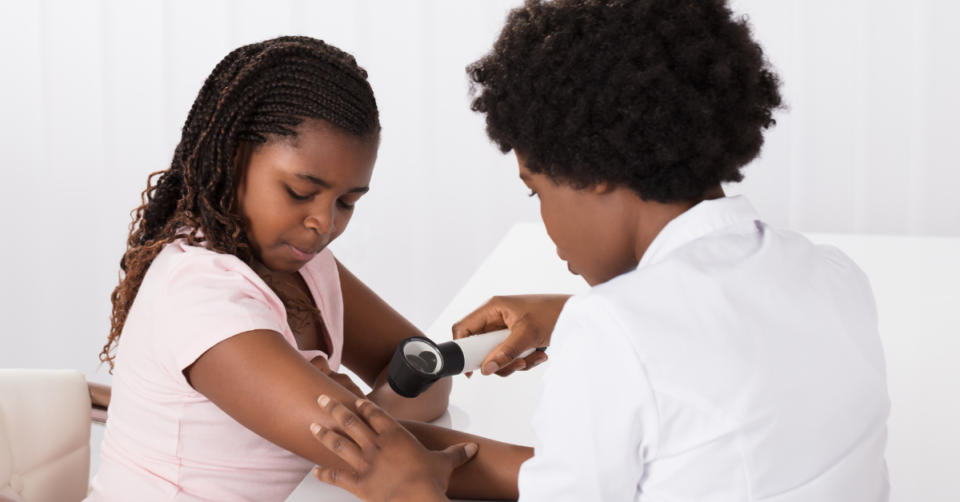

Atopic dermatitis (AD) is a complex medical condition, and no two eczema patients present with the same symptoms. Nor do they have the same triggers, though there can be commonalities. It can also become a lifelong chronic struggle so you need to become an expert in your own skin and be prepared.
Getting an appointment or referral can be hard enough with long waiting lists and a shortage of specialists. But once you've got a date and time in the diary, the really hard work begins. If you’ve ever come away from a hospital appointment confused and with unanswered questions, you’ll know where I’m coming from. It’s happened to most of us.
No matter what country you live in, navigating any appointment with your specialist can be hard work. You need to make sure you get seen, heard and understood so you’re happy with the treatment path provided for you.
I’ve had atopic dermatitis and chronic eczema all my life and have found it hard to get the help I needed. For instance, there was no adult service in my county, so I had to fight to see further afield at an already overburdened Dermatology Centre. Because it’s not life threatening,it feels like AD is not taken as seriously as it should be; from my own experience it can take over many aspects of daily life and also become central to mental health too. With this in mind I’ve put together these tips and suggestions to help you find your way to the right treatment.
If you haven’t yet managed to get a referral to a dermatologist, much of what is shared below will also be relevant, regarding research and preparation for your visit to the GP. Familiarise yourself with the NICE patient guidelines for your condition to help you understand what treatment is available and also what you’d like to try. You have a choice, so don’t be afraid to refuse any treatment you’re worried about and ask for something else. I recommend you take a proactive approach and ask for details on anything you’ve researched or a new drug or treatment you’ve heard about, don’t always wait for your doctor to recommend it.
Have a goal in mind - This can be daunting as you may not know what questions you have or what treatment you want. Start to note down what symptoms you struggle with the most, what areas of your body flare and cause the most discomfort. What would be your ultimate goal? What are your most troublesome symptoms? Atopic dermatitis can be doubly difficult as it waxes and wanes, flares and heals in cycles and may not be at its worst for your appointment. If you can prioritise objectives for your own health, it makes it easier to work with a specialist towards the management or healing goals you want.
Triggers, health and nutrition - Think also about what you think your triggers are. If you think food might be causing you skin problems, there may be a dietician you can get referred to. Keep a food, mood and symptoms diary for a few weeks prior to your appointment and go armed with the results. By recording the times of day and the situations that cause you the most discomfort, or the places and activities that seem to cause flares or symptoms to increase, could help you work out how to avoid issues and uncover answers.
Mental health and therapy - If you are finding your skin causes you a lot of anxiety, this is also something you might be able to get extra help with. Tell your dermatologist that you are interested in therapy; past trauma, depression, anxiety and low mood can have a direct impact on your skin health. A 2020 study(1) in the Journal of Allergy and Clinical Immunology, looked into Atopic Eczema in adulthood and the risk of depression and anxiety. They found that adults with atopic dermatitis are far more likely to develop depression and anxiety. There are many different kinds of therapy so find out what’s available and then think about what would work best for you.
Getting the right help to guide you towards finding a more positive mindset can really help with management and healing. If you are living with a lot of shame, anger, guilt and frustration that could well be playing out on your skin. Think of it as a canvas of your overall health - everything is linked; gut, brain, skin microbiome – a science we barely understand but more studies are being done.
Pain management – There are many pain medications available, and they can come with side effects and be addictive if used long term. Ensure you know the risks associated with any medication and ask your specialist for advice. Ask about local pain clinics as these are often available and will give you an opportunity to explore group therapy with others who have similar challenges. You may also benefit from one to one therapy to help you understand your pain, what it’s trying to tell you and what you can do to help manage the pain, through changing your lifestyle, getting further help or making use of resources available to make your life easier.
You don’t need to spend hours on this, just get an idea of what treatments you might be able to access. If you’re not sure, visit the NHS website and find the NICE guidelines for AD. Ask about the treatments you’d like to be considered for:
Ask as many questions as you can to ensure you’re happy about starting a new treatment, e.g.,
I also ask, would you be happy to use this drug? It can help you feel they are being genuine and understand concerns you may have. You want to find the solution that fits your current situation. For instance, if you are risk averse you should choose a safer option. If you are desperate and feel you have run out of options, you may choose a new drug or clinical trial.
Most dermatologists are very busy and realistically they may leap to the first response and the easiest solution. What we want to achieve is an open, frank and respectful dialogue with our specialist so that we can all work together towards a beneficial outcome.
Make sure they know what your goal is for your skin and what’s most important. It can be a good strategy to work on one thing at a time towards a healing goal.
Make notes to refer to and if you have found studies you’d like to discuss, take copies with you to share. Whilst your dermatologist has been seeing patients with atopic dermatitis for years, he/she hasn’t lived in your skin. You know your body and your own lived experience better than anyone. If you think they are not listening to your concerns, tell them. You have a choice how your skin is managed; you do not have to follow any treatment you’re not happy with. Be questioning and inquisitive and ask for alternatives.
If you feel like your specialist isn’t listening or dismissing your concerns, be firm and ask them directly for the treatment you would like. This is your skin, and you should be able to advocate for what you need.
If you still leave feeling your concerns have not been heard, here’s what to do
What’s important to remember is that you are not alone. According to eczema.org 1 in 5 children and 1 in 10 adults experience AD at some point in their lives. A smaller percentage of these go on to experience life long and more chronic skin problems. So it makes sense to try to connect with other fellow eczema people. There are many ways to do this, via blogs, social media groups, and forums.
I hope these pointers have been helpful at assisting you to become the patient advocate in your condition. Arming yourself with information can help give you peace of mind, knowing you are doing the best you can for yourself. Acceptance and understanding can help you live with atopic dermatitis and help others find answers too.
It’s taken me years to get there, but I finally find myself on a healing path that I’m happy with but it took time and effort to really dig into what motivated me and research to learn more. Get proactive and take control of your skin healing.
References

✕